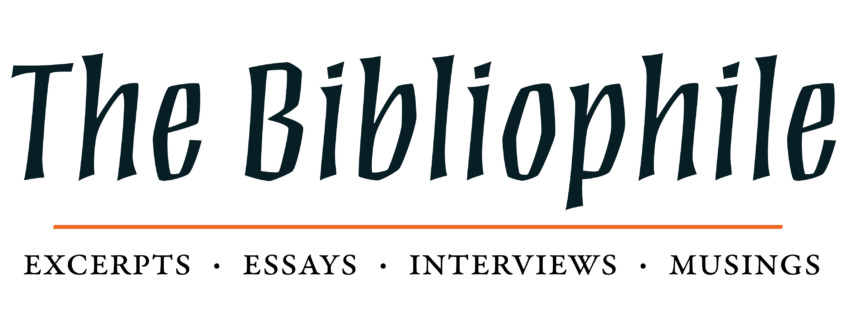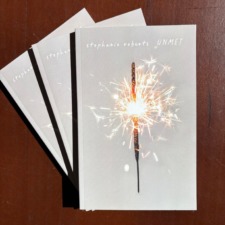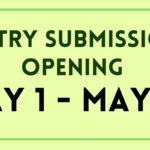The Bibliophile: Something there is that doesn’t love a wall
Want to get new excerpts, musings, and more from The Bibliophile right away? Sign up for our weekly online newsletter here!
***
Announcing the publication of UNMET by stephanie roberts (and our next open reading period for poetry manuscripts)
April is National Poetry Month here in Canada, and for our southern* neighbours, and I can’t think of a better way to celebrate than with the work of stephanie roberts, herself a citizen of both countries, and of Panama as well. We published UNMET, her sophomore collection, on Tuesday, April 1, though it’s a joke only as much as the Rose Garden events of Wednesday, April 2, can be called liberatory for any average inhabitant of Earth. As a dual citizen myself, born and raised and poetry-educated in the States, the question of national identity in art—what we mean by Canadian or American poetry—is often on my mind, to say nothing of times like these, in which allegiances, and the rejection thereof, are in overdrive.
Though her citizenships are not the subject of this collection, roberts’s vision does indeed contain multitudes, crossing—erasing—borders between styles and tones and modes. Rather than a title poem, this is a collection with title poems: seven, to be exact, called by or including the word “unmet.” It’s a contronym of sorts, at least conceptually: referring to that which is failed, thwarted, unfulfilled—love, desire, justice—but also to what may yet be possible. Similarly, its modes are capacious: roberts writes lyric, and surreal collage, and narrative equally well; addresses historic wrongs, and present frustrations, and the potential of the future; her voice is by turns vulnerable, powerful, playful, elegiac, at times wildly funny (“Of course I’m including the banana in the sale!”). Alongside her utterly unexpected turns of phrase, it’s this range that first caught my eye when the manuscript crossed the transom of our first open reading period,** and it’s what continues to reward me as I read these poems again and again, remembering what poetry is for: to challenge and console, argue and accept. To resist and to rest. To resist, sometimes, by resting.
Is it fruitless to wax poetic about poetics in April 2025? I’d suggest we should set art aside right around the time we determine it’s not the right moment for the production and consumption of food and the protection of clean water. In my former life, in what now feels like the halcyon days of the American university system, I once gave a poetry class a final exam consisting of a single question: What is poetry for? I didn’t have an answer. I only wanted a way to inspire original close reading of the poems we’d been studying rather than regurgitated lecture notes. It worked, and though I can’t recall a single argument advanced, this morning the answer feels obvious: it’s for right now. And for all the other nows. “This is what comes of taking dreams / off the horizon,” roberts writes in “Mall of the Sirens.” “Something there is that doesn’t love a wall, / that wants it down,” Frost writes in “Mending Wall,” a poem unwittingly co-opted by unironic bumper stickers proclaiming “Good fences make good neighbors.” What that something is, he does not explicitly say. But I’d hazard there are many answers to this question as well, one of them being: poetry.
Read a poem or two today. Read a few: you can start with stephanie roberts. Maybe endeavour to commit something to memory. Resistance comes in many forms, and there’s no tariff on what we import into the sovereign territory of the heart.
Vanessa Stauffer,
Managing Editor
***
Excerpts from UNMET
When Harold Offers a Fist Bump
I stare. May 2020, on top of everything
the cool takes a rise for Kalahari desert.
I shower three times a day, and at night
bounce sexual fantasies about air-conditioner
installers off the ceiling.
When the heat is remedied by rain
no Cinco de Mayo is great enough.
We finally got together a year late
between waves and pre-vaccine. I break
lockdown without knowing what to do
with my hands anymore. Forget lips.
No two-cheek kiss. Now a pseudo bow,
not at waist but a little bit more than nod.
Mad chirps and neon brights feather
a backyard biome. Outside our interiors we
talk poetry and past relationship bullshit.
My neighbours on their Balconville fake-
drunk singing like kids who curse for attention.
I can’t remember what absolute agreement
drives his extended fist. It emerges
like a train, in slow motion, on a track
I am tied to. How to look away? How
do we manage not to keep wrecking
everything? A moment the brain
refuses to provide the correct French word
at the correct French moment; it can’t
knit a hand grenade into
a reasonable story. South of us
they had yet to slalom into the madness
of the later part of the year, when they
hit half a million with a slight shrug
from inside a body bag.
We get up
from the tables of our lives so abruptly
we knock over the chair behind us.
Who was the last man I touched?
What risk was right?
for Harold Hoefle
George Junius Stinney, Jr.
In the third stanza he exits the poem,
black tears wishbone
ball lightning.
“On reflection,” he said, from the bottom
of his sepulchre, small dark brown fingers
stroking a hairless chin,
“I do not think it was
the hate what took my life.”
He straightens himself
on his slab of metamorphosed limestone.
It was the:
Cops kill white people all the time
I’m sure there’s another side to this story
If you just obey nothing will happen to you
My family came here legally
POC are the establishment now
I’m not racist but
“I reckon the stack and press of all that not-racist
eventually crowned that steel and wire diadem
upon my brow Bible at my bottom.”
Lord raise cool sponge to the opening of ebony thirst;
extend a pink hand that smiles without teeth.
White crimes of obedience click as silent syntax to
the flat and sharp sentences of death.
Decades without name, no headstone
no footstone, no identity to his rest lest the Samaritans
lynch even his bones after Old Sparky’s revered kiss.
In his final stanza he rises red and exonerated
named in the hearts of the fawn born
not as static electricity but as bolt
that strikes open the door.
I Taste Good and Bad
At the end of a cartoon, one of the characters looks to the camera
And tells us take courage, tells us be vulnerable with
The ones we love. It comes to this—memento
Mori from a talking banana. I didn’t need it to tell you the truth
And what surprise when this sparked happiness can’t make you care.
When hurt I learned not to look in your eyes;
If I wanted to make you disappear I said I didn’t feel well.
Is the present road a grocery store or a walk through a needled forest?
By August, tho masks are briefly still required,
They remove the minimum-wager, at the door,
And management trusts us to sanitize our carts, our hands.
The man ahead of me walks in without stopping
While I squirt and rub the lubey gel, marvelling at how
It’s possible we aren’t blanketed in our own screams. I guess
I marvel because I want to participate, right now, add some
Shatner’s Captain Kirk, head-thrown-back, fists-pumping-
For-volume, screams. I loved you from genesis to revelations
Which silenced you like snowfall. Christians ponder what person
In their right mind could see god in all the old guy’s glory
And not worship? It seemed to them Lucifer was
By every definition criminally insane. We believe
If people could see our entirety they would run in disgust.
If we like surgeons could see our identical spaghetti
Spinal chords and the harms we suffered as children,
They might forgive us our cheats and bigotry.
In a tender and misguided way you euthanized love
Rather than suffer our inevitable parting you were mixing up
Gin and tonic style. The same ethos undergirds our invention
Of Satan the way we spread peanut butter on toast, when
We’re starving, an end to the unbearable mystery of living
The meaning of cancer and car crashes which pokes at us
Like the delicate edge between blade and grass, wind and wind,
Content and content, produce and produce, recreate and recreate,
And lead and lead. Yogurt is half-off so I fill my cart,
The neon-pink stickers beckon as if dairy goods on the edge
Of edibility need lipstick. And what says yogurt like pickles?
I burn old journals, manuscripts, and letters, unwilling to relive
A past with its whimsical relevance or obstinate irrelevance. Why
Try to kill the already so unlikely? Why not rather hope
And purchase this absolutely tremendous jar of garlic pickles.
And now, I Gotta Get Me Some™ chocolate syrup, and leave
The infliction of sorrow to god’s eager hand. I’m not asking
You to give what you haven’t got, like a beaver’s dam,
I’m telling you I can make something of unlikely ingredients.
I have somehow done so before and the earth turned
As usual. I am tempted to buy toothpaste.
My hand hovers over the red, white, or blue boxes, and
Spearmint goes in the cart. I was once in a church of surprise
Birthday parties and practical jokes. They were maniacal about it.
One birthday, the pastor’s young wife had to go change
Out of her nightgown; it’s not right that someone should look
That attractive so unprepared. Youth, its own beauty.
And once that same Beauty filled chocolate cupcakes
With creamy white toothpaste because that was what we were
Doing those days, biting hilariously into all the time in the world.
I go to the self-checkout and scan the boxes of toothpaste,
Scan my points card then place everything back in the cart before
Pushing it all into the ditch by the parking lot. I don’t know
What is obvious. I don’t know if you can see what I have suffered
To be ready to be me. I understand now how painfully too-good-
To-be-true slices, a papercut to the tongue. It hasn’t been easy
For either of us to arrive at my hand in yours. How far we keep
Coming thru zoos of zebras and pandas, misaligned decades,
Madness and marriage to be both at this sentence. Why discount
All this choice as fate? I don’t know what’s in a fly’s mind.
What makes it buzz my head and hands instead of
The maple-syrup-soaked leftovers at the next table. Flies can’t care
About which humans are murderous. Only desire. If you let me
Feed you I would fill your mouth with such tart sour sweet minty
Tenderness you wouldn’t believe it.
***
In good publicity news:
- UNMET by stephanie roberts was reviewed in The Miramichi Reader: “A constancy is [roberts’s] vitality of alert, surprising, and precise language.” roberts was also interviewed in The Ex-Puritan and Open Book.
- Ripper: The Making of Pierre Poilievre by Mark Bourrie was reviewed in
- The Globe and Mail by Charlotte Gray: “A searing but convincing critique.”
- The Hill Times: “Every Liberal in their war room, every journalist covering the campaign . . . owes it to themselves to read Bourrie’s Ripper.”)
- That Shakespearean Rag: “Bourrie transcends a simple biography and creates a snapshot of our riven historical moment.”)
- The Tyee: “A phenomenal effort, carefully researched and nicely written. Ripper should be widely read by everyone who cares about the value of casting an informed vote on April 28.”
- Bourrie was also interviewed for the Toronto Star.
- The Passenger Seat by Vijay Khurana was reviewed in The Tyee: “In Cold Blood meets Grand Theft Auto with the psychological complexity and moral anguish of Dostoevsky and inputs from third-wave feminists.”
- Ira Wells, author of On Book Banning, was interviewed in The Jacobin.
***
* Technically our northern neighbours, here in Windsor.
** Speaking of: poets with book manuscripts should keep an eye out here and on our socials, as we’ll be sharing the guidelines for our May 2025 reading period imminently.







